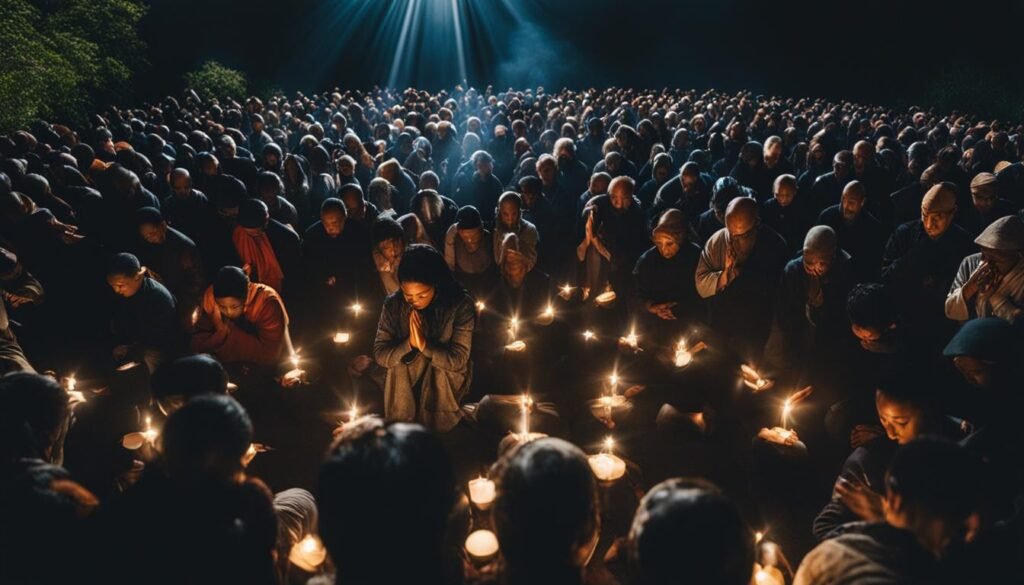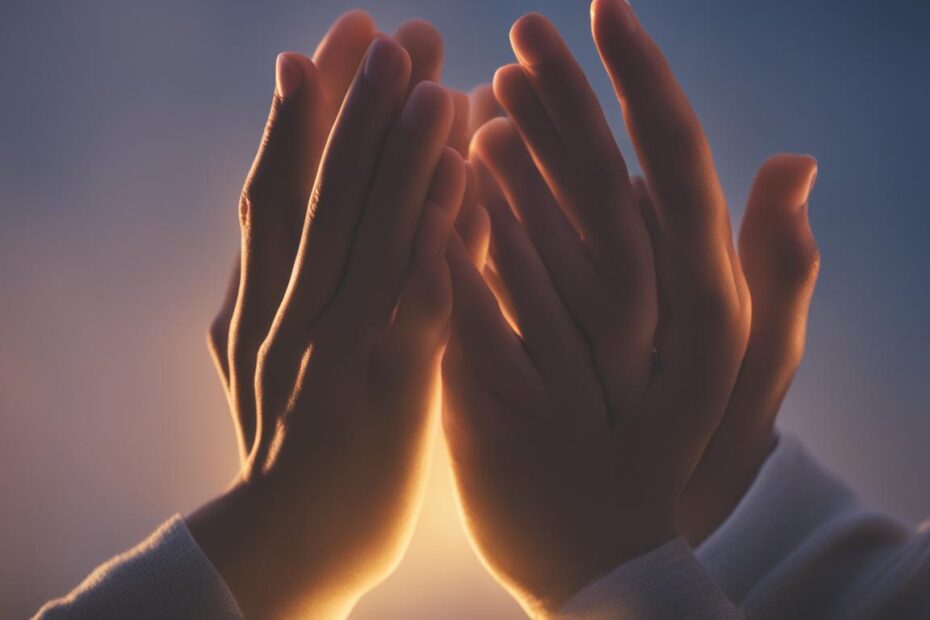Welcome to our friendly guide on understanding the meaning of La Supplication. La Supplication refers to the act of supplicating, which is the earnest and humble asking for something, usually from a higher power. This form of prayer and request for divine intervention holds deep cultural and spiritual significance. Let’s explore the meaning of La Supplication together and discover its relevance in various contexts.
Key Takeaways:
- La Supplication meaning refers to the act of earnestly and humbly asking for something from a higher power.
- Supplication is a form of prayer and request for divine intervention.
- Understanding La Supplication is crucial to grasp its cultural and spiritual significance.
- Supplication can be found in various religious traditions around the world.
- Supplication holds significance in personal, community, and daily life.
The Significance of Supplication in Religion
Supplication has deep roots in religion and is found in various religious traditions around the world. It is often used as a form of communication with a higher power, whether it be God, the gods, or ancestors. Supplication can be seen as a way of expressing one’s devotion, seeking guidance or help, or simply acknowledging a sense of humility and dependence on the divine. The origin of supplication can be traced back to ancient religious practices and has evolved over time to fit different cultural contexts.
Supplication is the humble act of reaching out to a higher power, recognizing our limitations as human beings and seeking divine intervention. It is a way to connect with the divine, to express our needs, desires, and fears, and to find solace and guidance in times of difficulty or uncertainty.
In many religious traditions, supplication is accompanied by rituals, prayers, and offerings. For example, in Christianity, supplication is often integrated into the practice of prayer, where believers humbly ask for forgiveness, guidance, and blessings. In Islam, supplication, known as dua, is a central part of worship, allowing Muslims to express their desires and seek help from Allah. Hinduism also has its own form of supplication called puja, where devotees offer prayers and perform rituals to honor and seek the blessings of deities.
| Religion | Supplication Term | Description |
|---|---|---|
| Christianity | Prayer | The act of humbly communicating with God and seeking His guidance and blessings. |
| Islam | Dua | The act of supplicating to Allah, expressing one’s desires and seeking help. |
| Hinduism | Puja | The act of offering prayers, rituals, and sacrifices to deities as a form of supplication and devotion. |
Supplication serves as a means of deepening one’s spirituality, fostering a sense of connection to a higher power, and finding comfort and guidance in times of need. It allows individuals to express their vulnerability, surrender their worries, and trust in the benevolence and wisdom of the divine. The act of supplicating can bring a sense of peace, hope, and reassurance, providing a source of strength and resilience in the face of life’s challenges.
Examples of Supplication in Different Cultures and Belief Systems
Supplication takes different forms and has different names in various cultures and belief systems. It is a universal practice that transcends religious boundaries and is deeply ingrained in human spirituality. Let’s explore some examples of supplication in different cultural contexts:
Christianity: Prayer
In Christianity, supplication is often referred to as prayer. It is a fundamental aspect of Christian worship and is practiced in various forms, such as silent prayer, recitation of scripted prayers, and spontaneous personal prayers. Examples of supplication can be found throughout the Bible, with the Lord’s Prayer being one of the most well-known instances of supplication in Christian scripture.
Islam: Dua
In Islam, supplication is known as dua and holds significant importance in Muslim worship. Dua is the act of calling upon Allah, seeking His guidance, mercy, and blessings. Muslims engage in dua throughout the day, offering personal prayers and seeking forgiveness or assistance. The Prophet Muhammad emphasized the power of dua and encouraged Muslims to supplicate sincerely and persistently.
Hinduism: Puja
In Hinduism, supplication takes the form of puja, which involves making offerings, performing rituals, and reciting prayers to deities. Puja is a sacred act of devotion that can be performed individually or collectively. It is believed to establish a connection between the worshipper and the divine, allowing for the expression of gratitude, reverence, and supplication for blessings and guidance.
Native American Spirituality: Ceremony and Song
In Native American spirituality, supplication is often expressed through ceremonial rituals and sacred songs. Native American tribes have unique practices that involve offering prayers, songs, and dances to honor the spirits and seek their guidance and protection. These rituals are deeply rooted in the interconnectedness of nature, people, and the spiritual realm.
| Culture/Belief System | Supplication Form | Key Practices and Expressions |
|---|---|---|
| Christianity | Prayer | Silent prayer, scripted prayers, personal prayers |
| Islam | Dua | Calling upon Allah, seeking guidance and blessings |
| Hinduism | Puja | Making offerings, performing rituals, reciting prayers |
| Native American Spirituality | Ceremony and Song | Ceremonial rituals, sacred songs, dances |
The Power of Supplication in Personal and Community Life
Supplication is not limited to religious practice alone; its power extends to personal and community life as well. In one’s personal journey, supplication can provide a sense of comfort and guidance. It allows individuals to express their needs, desires, and seeking forgiveness while finding solace in the presence of a higher power. Supplication is an act of humility that allows people to acknowledge their dependence on a greater force beyond themselves.
Within a community, supplication can serve as a unifying force. It brings individuals together in a shared experience of faith, fostering a sense of belonging and creating a supportive network. In times of crisis or challenge, the community can come together in prayer and supplication, seeking the well-being and prosperity of everyone.
The transformative power of supplication becomes evident as individuals and communities experience personal growth and collective progress. Supplication cultivates a deep sense of gratitude, humility, and compassion, enabling individuals to find peace and resolution to their problems. It allows them to forge a strong spiritual connection with the divine, ultimately leading to positive changes in their lives and society as a whole.

The Role of Supplication in Personal Life
Supplication holds great significance in personal life, granting individuals a sense of purpose and direction. It provides a channel for expressing hopes and desires, seeking forgiveness, and finding solace in times of hardship. Through supplication, individuals can tap into their inner strength and connect with a higher power, finding guidance and support along their life’s journey.
The Impact of Supplication in Community Life
In the realm of community life, supplication acts as a binding force that unites people in a common purpose. It creates a shared experience of faith and fosters a sense of togetherness and support. Supplication in a community setting allows individuals to come together, transcending their individual struggles, and collectively seek blessings, well-being, and prosperity for the entire community.
The Transformative Power of Supplication
Supplication has the extraordinary ability to bring about profound transformation in the lives of individuals and communities. It is a powerful act of communication with a higher power that can lead to personal growth, spiritual development, and a deeper connection with the divine.
One of the key benefits of supplication is the guidance it provides. When we supplicate, we humbly ask for help, guidance, and resolution to our problems. Through this act, we open ourselves to receiving divine wisdom and insights that can lead us on the right path. Supplication allows us to tap into a source of knowledge and understanding that is beyond our human limitations, providing us with clarity and direction in our lives.
“Supplication is the key that unlocks the door to transformation. It is through this humble act of prayer and devotion that miracles happen, burdens are lifted, and lives are forever changed.”
Another transformative power of supplication is its ability to bring peace and solace during times of grief or hardship. When we supplicate, we surrender our worries, fears, and sorrows to a higher power, trusting that they will be taken care of. This act of surrendering allows us to find inner peace and comfort, knowing that we are not alone in our struggles. Supplication provides us with a sense of hope and assurance that we are supported and loved, even in the midst of our darkest moments.
Furthermore, supplication helps us cultivate important virtues such as gratitude, humility, and compassion. By recognizing our dependence on a higher power and expressing our gratitude for the blessings in our lives, we develop a deeper appreciation for the present moment. Supplication also fosters humility, as we acknowledge our limitations and surrender our egoic desires. This humility opens our hearts to compassion, allowing us to extend our supplications to others and create a ripple effect of positive change in the world.
| Transformative Power of Supplication | Benefits of Supplication |
|---|---|
| Guidance in life’s challenges and decisions | 1. Clarity and direction |
| Peace and solace during difficult times | 2. Inner peace and comfort |
| Development of virtues such as gratitude, humility, and compassion | 3. Cultivation of gratitude, humility, and compassion |

The transformative power of supplication is not limited to the individual. When communities come together in collective supplication, it can have a positive impact on society as a whole. It unites people in a shared experience of faith and fosters a sense of belonging and support. Through collective supplication, communities can find strength and resilience, overcome challenges, and work towards the betterment of society.
Incorporating supplication into our daily lives is the key to harnessing its transformative power. By dedicating regular time for prayer and reflection, creating sacred spaces for supplication, and engaging in meaningful rituals, we can cultivate a deep and meaningful connection with the divine. Supplication is a practice that transcends religious boundaries and can be tailored to individual beliefs and preferences, making it accessible to everyone seeking transformation and spiritual growth.
Incorporating Supplication into Daily Practice
Supplication is a powerful practice that can be incorporated into daily life to cultivate a deeper connection with the divine and experience its transformative effects. There are various ways to incorporate supplication into your daily routine, depending on your beliefs and personal preferences.
Setting aside dedicated time for supplication: Find a time that works best for you, whether it’s in the morning, during lunch break, or in the evening before bed. Create a sacred space where you can sit or kneel comfortably and focus on your supplications.
Using written or verbal prayers: Some people find it helpful to write down their prayers or recite them aloud. This can help to clarify intentions and bring a sense of focus to the supplication process.
Engaging in rituals and ceremonies: Incorporating rituals or ceremonies into your supplication practice can add depth and meaning. This could involve lighting candles, burning incense, or using specific objects or symbols that hold personal significance.
It is not the words we speak, but the sincerity and intention behind them that truly matters in supplication.
The Power of Intention
- Focus on your intention: Before beginning your supplications, take a moment to reflect on what you truly desire or seek guidance for. Connect with the emotions and feelings associated with your intention.
- Release attachment to outcomes: After expressing your desires or requests, release any attachment to specific outcomes. Trust that the divine knows what is best for you and will guide you accordingly.
- Express gratitude: Always express gratitude for the blessings and guidance you have received, even before your supplication is answered. Gratitude cultivates a positive mindset and opens the door for more blessings to flow into your life.
Remember, supplication is a personal and meaningful practice. Explore different methods and find what resonates with you the most. With consistent effort and an open heart, incorporating supplication into your daily life can bring about profound spiritual growth and a deeper connection with the divine.
Conclusion
In conclusion, La Supplication holds deep cultural and spiritual significance as a form of earnest and humble communication with a higher power. It is a practice found in various religious traditions worldwide, serving as a means of expressing devotion, seeking guidance, and acknowledging a sense of humility and dependence on the divine.
The act of supplication has the power to bring about personal and collective transformation, providing comfort, peace, and resolution to individuals and communities. It fosters a deeper connection with the divine, cultivating spiritual growth and offering hope in times of hardship. Through supplication, individuals can also develop a sense of gratitude, humility, and compassion.
To incorporate supplication into daily life, one can set aside dedicated time for prayer, create a sacred space, use written or verbal prayers, and engage in rituals and ceremonies. By doing so, individuals can experience the transformative benefits of supplication and strengthen their connection with the divine.
FAQ
What is la supplication?
La Supplication refers to the act of earnestly and humbly asking for something, usually from a higher power.
Where does supplication originate from?
Supplication has deep roots in religion and can be found in various religious traditions around the world.
What are some examples of supplication in different cultures?
In Christianity, supplication is often referred to as prayer, while in Islam it is known as dua. Hinduism has its own form of supplication called puja.
How does supplication impact personal and community life?
Supplication provides comfort, guidance, and a sense of unity within individuals and communities. It can be a source of strength during times of crisis and promote a sense of belonging.
What is the transformative power of supplication?
Supplication can bring about personal and collective transformation, fostering spiritual growth and providing solace in difficult times. It also cultivates gratitude, humility, and compassion.
How can supplication be incorporated into daily life?
Supplication can be practiced through dedicated time for prayer, creating a sacred space, using written or verbal prayers, and engaging in meaningful rituals and ceremonies.








